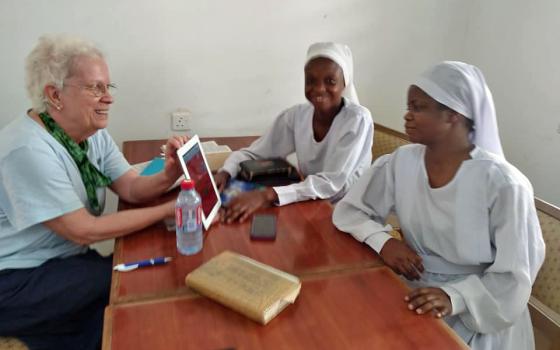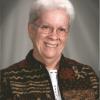On the other side of the world, for the first time in my life, my day began and ended with the sound of the Muslim call to prayer. It sounded at 5 a.m. and 7 p.m. in the predominantly Muslim town of Sang, in Ghana, West Africa.
I traveled to Ghana in March, accompanying a volunteer team of dentists and audiologists who travel there annually to bring health care to the children of Nazareth Home for God's Children. A former colleague of mine, Lee White, was going as a volunteer for the tenth time and invited me to join her.
Currently on sabbatical after serving five years in leadership for my congregation — the Grey Nuns of the Sacred Heart in Philadelphia — I wanted a ministry experience in an underserved area, helping in whatever way I could.
The home cares for disabled children, abandoned by their families because of cultural superstition about their disabilities. Called "spirit children," they are put out or abandoned by family or villages because of cultural superstitions about them, rendering them disposable. This community of love rescues them from certain death, and helps them to grow to their fullest potential.
I expected to work with the children but Sr. Stan Therese Mario Mumuni, foundress of the Marian Sisters of Eucharistic Love, and of the Nazareth Home, asked if I would give a retreat and classes on religious life to her novices, when she heard I had been a novice director and currently am a spiritual and retreat director.
The Marian Sisters of Eucharistic Love are a new community of women religious, and the novices are the "seeds" of their congregation. Sister Stan thought the young sisters would benefit from some new understanding about religious life and spirituality.
The African sisters, all high school graduates, are in their 20s. They had just become canonical novices and were missing their families and their ministry contacts. But they understood the need for a more contemplative type of year.
They were eager to learn, but I didn't have a lot of materials or resources to use. Their bibles were all different versions and falling apart. Their prayer books were photocopies stapled together. I had a copy of the "Viability of Religious Life" report done by a group funded by the Hilton Foundation, and I used that as part of my classes.
They wanted to learn about religious life in Ghana and the rest of the world. They were curious about why vocations were declining in Europe and North America. We discussed the shift in Europe and North America from corporate ministries to more individual ministries, and from a hierarchical governance to a more relational style of governance. Our discussions were deep, interesting and lively.
When I wasn't with these joyful and dedicated young sisters, I played with the children, who enjoyed touching my hair, so very different from their own. The children loved holding hands and being held.
The children ranged in age from infants to young adults in their early twenties. Some have normal intelligence and go to school during the week in the nearby town of Tamale, returning to Nazareth Home for the weekends. Simon — one of the first children to come to Nazareth Home with his two siblings — is finished with high school now, and is hoping to attend nursing school.
I expected the children to be more compromised than I found them. Most were healthy, happy and full of energy. Some had schizophrenia, hydrocephalus, or seizure disorders; others were missing limbs, or hands or feet; some had been poisoned, with the resulting health conditions. Some had no disabilities.
The children loved to dance! As soon as music began to play, they all started moving to the beat of drums and beaded gourds. They all got along well and helped each other to get to meals, go to school or to prayers in the complex. They had names like Precious, Solomon and Caesar. There was an adorable set of 2-year-old twins named Philip and James, who were there because their mother had died and because twins are considered a bad omen.
My engagement with the young sisters and my play time with the children were happy distractions from the intense heat and the shortage of bathing water in the dry, desert-like environment. The heat was very draining, physically. The afternoon "siesta" was a great gift, which gave us a break from the heat.
March is one of the hottest months of the year but it is when the dental team goes because the dentist who organizes the mission trip has dental students (on break from school) join him for this humanitarian mission.
This land on the edge of the desert is dry and weary, sandy and dusty. The temperature is over 100 most of the time and the breezes, if any, are like hot breath.
Sandals are the footwear of choice. But sandals in dusty, sandy soil admit pebbles and dirt, making it difficult to keep your feet clean. I gained a fuller appreciation for the hospitality afforded by foot washing in Jesus' culture! Feet can get very dirty, and blisters can develop. No wonder Jesus reprimanded one of his hosts for not offering such a courtesy and praised the woman who washed his feet with her tears. Foot washing is a necessity as well as a courtesy; a gesture of hospitality and provides refreshment to weary travelers in a dry land.
A new well had been dug to provide water to the complex but was not yet working. We drank bottled water and were provided with a large trash can full of water for bathing and washing clothes. I really learned how precious water is! I now value water more and use it more carefully.
Despite the privations I observed and experienced, my journey and my contact with the Ghanaian people brought me many gifts. Even in their poverty, Ghanaians are peaceful, joyful, creative and industrious. Respect for others is always evident, particularly respect for older people.
I had a chance to visit the "slave castles" in the south. This was a disturbing, overwhelming experience. The dark, dank dungeons, where people were held before being sent off to unknown places, were a tragic reminder of a dark period of history. The "Door of No Return" was where captive persons were shipped off to Europe, the Caribbean and North America. It was a small consolation to me to hear that the fewest slaves were sent to the United States and Canada; most went to Europe and the Caribbean.
This is an anniversary year marking the beginning of the slave trade. That "Door of No Return" has been renamed "Door of Return" — as Ghana says, "Akwaaba" (welcome)!
Most striking is the presence of God in the spirit and the culture in Ghana. Even in the humblest of little shops, there were religious sayings or words reflective of God. Taxis and jitneys had religious sayings on the back windows of the vehicles. The people's lives are not easy but they are very religious. Although we may have different color skin, my God is the same as theirs. I expected to find God in Ghana. I was not disappointed.
[Mary Elizabeth Looby has been a Grey Nun of the Sacred Heart for 52 years. With an academic background in pastoral care and counseling, and training in spiritual direction, she has been a spiritual director and retreat director for over 35 years. She served on her congregation's Leadership Council, and currently lives in Philadelphia, where she does spiritual direction and retreat ministry.]

